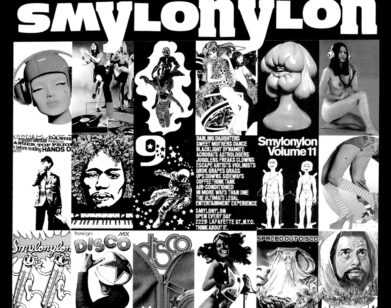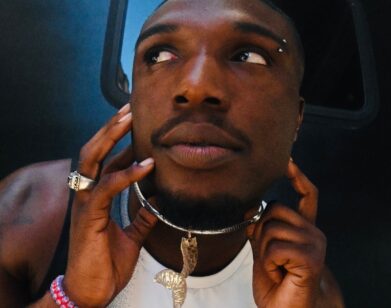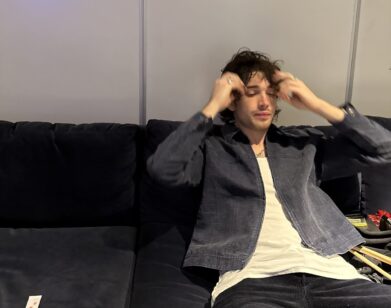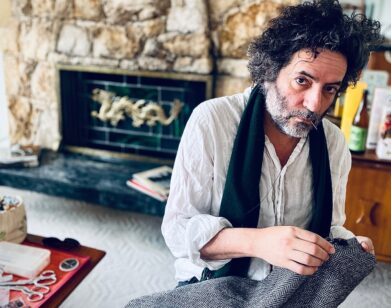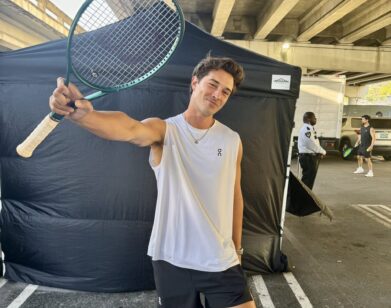Callers, Revivified
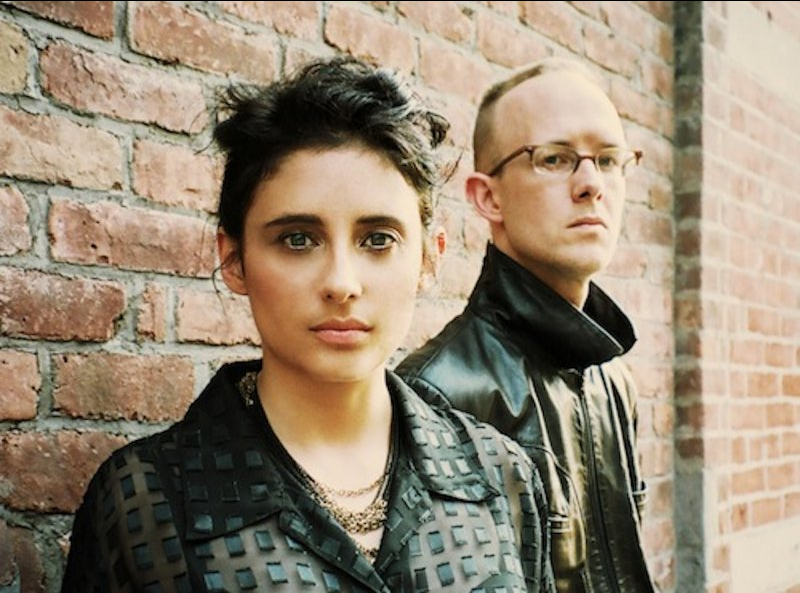
PHOTO COURTESY OF AARON STERN
Brooklyn-based indie rock outfit Callers have expanded from a two-piece, to a three-piece, to now a four-piece group in the eight years Sara Lucas and Ryan Seaton, the two members at the core of the group, have been playing music together. “We met in New Orleans and played music down there and then moved to Providence and played music there for a couple years, so we’ve been playing for a while,” explains Seaton. In 2010 Callers released Life of Love, a nine-track disc that served as a follow-up to 2008’s Fortune. “It sort of feels like we released those albums into a vacuum,” says Lucas.
As the band’s numbers increase, though, so too does their following. Callers is set to play several shows with indie folk-rock duo Wye Oak in September, including Music Hall of Williamsburg tomorrow night, and indie-rock group Dirty Projectors in October.
On their next effort, Reviver, contrapuntal bass lines, bright, splashy guitars and Lucas’ enchanting, complex vocals feel fully formed. It reflects the addition of Keith Souza and Seth Manchester, who aside from their work with Callers, own Machines With Magnets, a recording studio in Providence, Rhode Island. We spoke with Lucas and Seaton about bringing on Manchester and Souza, their writing process, and going to high school with Nelly.
ALEX ERIKSON: How long have you guys been in New York?
SARA LUCAS: We’ve been here six years.
ERIKSON: Have you known each other the whole time?
RYAN SEATON: We met in New Orleans and played music down there and then moved to Providence and played music there for a couple years so we’ve been playing for a while.
ERIKSON: How did you guys meet?
LUCAS: At a café.
SEATON: Working at a café in New Orleans. It opened up at 5 am or something, and checking out what each other decided to throw on the stereo, we decided that we probably should try playing together.
ERIKSON: Are you still a three-piece?
LUCAS: There’s four of us. There’s two new members of the band.
SEATON: It’s been Sara and I the whole time, but we’ve always used—well, not used, that’s the worst word in the world—we’ve always played with different drummers. So it’s been a three-piece most of the time. Whatever town we’ve been in, we’ve hooked up with different drummers and played. Our friend Don Godwin was the drummer on this record and he’s been playing tour dates for the past three years or so. He did some of the writing on this record, as well. But since he’s not able to tour anymore, the engineers that we worked with got really involved in the creative process.
LUCAS: They co-produced the record.
SEATON: When they heard that Don had to bail on touring, they both offered to join the band. One of them is a drummer and the other guy—we were all talking about how we were going to incorporate the new sounds we were using live—and was like, “I’ll just do it.” So those two guys joined, and now we’re just starting to play as a four-piece. We’ve played three shows so far.
LUCAS: It’s great. We played a show in Providence, we played a show at Union Pool and then we opened for Dirty Projectors in Boston and it went really, really well. It was really awesome.
ERIKSON: I love the contrapuntal things that are happening between the bass and the guitar in a lot of your writing. Like in the beginning of “Life of Love.” Take me through the songwriting process. Where does that come from?
SEATON: The bass and the guitar, that’s just how I play. I’m playing that stuff at the same time.
LUCAS: That’s one guitar.
SEATON: So that was done mostly as a three-piece. There’s some light overdubs in the background, but it’s just down-tuned bass strings and then I’m doing the contrapuntal stuff.
LUCAS: I mean, “Life of Love” is a very live record. Like, Ryan and Don went into the studio and did that live. And then there was one day where I had to do five vocal tracks. I think what’s incredible about Ryan—and people have no idea—is that he’s playing all of that live by himself.
ERIKSON: Are you still writing like that with four members?
SEATON: We’re working a little differently now. For years, it was just Sara and I, and occasionally we’d link up with a drummer, but for what we wanted to do, I just kept kind of expanding how I played just to incorporate other sounds. We didn’t have any other gear, we didn’t have any other personnel, so I was just doing as much as I could to sort of fill out the sound. When we started playing with Don, it really became a process of taking cells of ideas and putting them through the wringer again and again—on tour, live at the shows, blah, blah, blah—to really work out how we wanted the songs to sound. And often Sara was usually the one to say, “The whole feel of this is wrong.” We’d play it for months, and all of a sudden she’d say, “The feel of this is completely wrong.” And we’d change the time signature of the song, or we’d change the rhythm, or I would change my part completely, and we’d really work out songs live and then record them. They would continue to develop over time after that. With this record, we really went after tone. We isolated sounds, like one piece of the kit might be played at a time.
LUCAS: But all of the songs are really different. It sounds totally different [from Life of Love]. I mean, there’s some tracks where we did all kinds of layering, but the single that’s coming out soon is just two guitars and a kit.
SEATON: Basically, we went after tone first and were really diligent about the sounds we were getting and really constructed the record in the studio, and after the fact we figured out how to do everything live. And it’s working out pretty miraculously, how easy it’s been to arrange.
LUCAS: Kinda fun.
SEATON: It’s the opposite of everything we’ve done before.
LUCAS: Although we didn’t have a ton of time. We did everything pretty quickly. It wasn’t like, here’s a shitload of money and go and do it. It wasn’t like that.
SEATON: We would have the souls of the idea in place and I arrange most of it and I would do that at home with ProTools. And then I would relearn everything I did then go to the studio and just knock it out.
LUCAS: But it’s not like, “That’s a really cool beat. Maybe we should put this on top of it.” It’s so intentional.
ERIKSON (to Lucas): Let’s talk about your voice for a second. Where did you start singing?
LUCAS: I’ve always sung. I never had like an “a-ha” moment. I’ve always sung in front of people. I think the first time I sang in front of a ton of people I was like eight or nine. I was in third grade. Basically, my mother sang to me as a kid. I really think I learned pitch from her. Beautiful voice. Great pitch. We were on tour, we went to my house, and she sang three of the songs off of Life of Love, in the exact key, a capella, just for fun. She just has a really good ear. I grew up in a very musical community in St. Louis. I was just given the opportunity to sing all of the time. It was just really nurturing. Whether I was in choirs or singing in blues clubs or gigging at weddings. I just did everything. I mean, it was the ’80s and ’90s. I don’t know what it’s like for like an 18-year-old you might interview.
ERIKSON: Tell me about blues clubs. Which clubs did you sing in?
LUCAS: Some of them don’t exist anymore. In high school, my direct community that I grew up in was like an activist, working middle-class black community, so I grew up with, like, spirituals and gospel music and civil rights songs, and I knew all that as a child, which was really a tremendous gift for anyone in this century to grow up with. And when I’d ask my elders or other people I grew up with if I should sing or what I should sing they would say, “Go down to Beulah’s [Red Velvet Lounge]. Sit in with this guy I know.” One time I sang live on the R&B radio station in front of probably 1500 people with the Def Comedy Jam. Those were the things I would do. I would sing at somebody’s wedding, or just anything I could do. There was no like, “That’s not cool.” Fontella Bass lived down the street. Chuck Berry lives down the street. I went to high school with Nelly. [laughs]
SEATON: Tell him about when you first went into your college dorm room.
LUCAS: Oh god, really? At this interview? I mean I feel like I had a really rich musical background. I knew a lot about music, especially black music jazz, gospel, whatever. You know, growing up where I did. But I went to college—it was a little liberal arts college that shall remain unnamed, and I walked in the dorm and I didn’t know what they were listening to and I was like, “Oh, what are you listening to?” And it was fucking Bob Dylan. I’d never heard Bob Dylan. People don’t give a fuck about Bob Dylan where I’m from. [laughs] I mean, Bob Dylan’s awesome. He’s a genius. No question. But that’s how far removed from the white rock world I was.
ERIKSON: It seems fitting that you met in New Orleans.
SEATON: That’s one of the reasons it worked. It’s just so rich down there. The community is so rich.
LUCAS: And people interact in ways that don’t happen in New York. Like musicians in New Orleans, it’s a family thing a lot of times. It’s just such a part of the culture. People breathe it. It’s like a language, which is what I was familiar with growing up with, but you know, New Orleans is such a less reserved city than St. Louis.
ERIKSON: How did you end up in New Orleans?
SEATON: Who knows?
LUCAS: Oh, you met a Cajun girl and followed her there.
SEATON: Hey, listen.
LUCAS: It’s a good story. And she was cool. I went to college and knew I wanted to teach part time and play music… and just kind of figure it out and not spend money. I knew I’d end up in New York. And the music, I mean, being there is so like…
SEATON: …It changed how I hear and experience and participate in music. Just being there. Just living there for a couple years totally changed my ears.
LUCAS: I don’t want to harp too much on New Orleans… I mean, we live in New York, and we love New York.
ERIKSON: Ok, tell me about how Reviver compares to your previous work.
LUCAS: [On] Life of Love I feel like we were reaching, because we had a record before that Fortune, which is kind of introspective, I think. Life of Love is really reaching out. I feel like that was a time when we were not grabbing things, but just really…
SEATON: …And we had to record it in different studios over the course of a year, because we just didn’t have any money.
LUCAS: But we only probably recorded for six days total. We sold the bass drum to pay for a day of recording like halfway through. We were like, “We don’t need the bass drum anymore to do these songs.” We were so broke. [Reviver] is more of a return.
ERIKSON: Do you write lyrics together?
LUCAS: There’s collaboration on everything that we do. There are some songs I wrote all the lyrics too and then there’s other songs where Ryan wrote almost all the lyrics. Then there’s a lot of editing that goes back and forth. He often has this incredible way of telling me how I feel. It’s really amazing. Because we’ve known each other for so long.
ERIKSON: Where will you guys be in six months? A year?
LUCAS: Well, the album is coming out in October. We have a couple things in the works. Going on tour in September with Wye Oak.
SEATON: We toured a lot with them last year.
LUCAS: We just hope to be touring a lot and playing with other incredible musicians that we love.
CALLERS’ REVIVER IS OUT OCTOBER 9. THE BAND WILL PLAY MUSIC HALL OF WILLIAMSBURG TOMORROW NIGHT, SEPTEMBER 20. FOR MORE ON CALLERS, VISIT THEIR WEBSITE.

